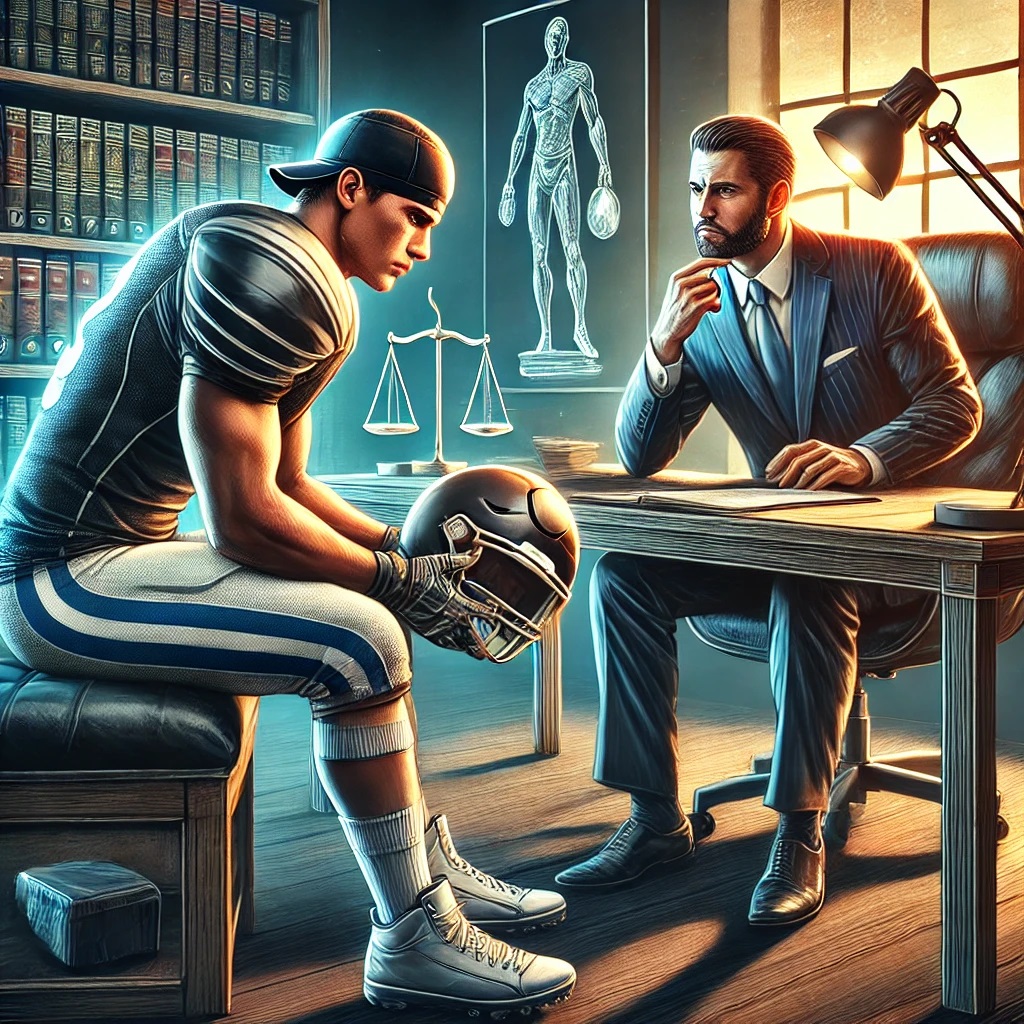By Rene Munoz
February 2025 is shaping up to be an exciting time as New Orleans gears up to host the Super Bowl at Allegiant Stadium. While fans cheer on their favorite teams, it’s a perfect moment to highlight a topic that often goes unnoticed in the world of sports: workers’ compensation for athletes. This issue, particularly in cases involving head injuries like traumatic brain injuries (TBI) and mild traumatic brain injuries (mTBI), is as relevant to professional athletes as it is to workers across other industries.

Workers’ Compensation for Professional Athletes
Professional athletes face unique challenges when it comes to workers’ compensation. Unlike most workers, their “workplace” is a field, court, or arena, and their job inherently involves a high risk of injury. Despite their fame and high earnings, athletes are employees and, in many cases, are eligible for workers’ compensation benefits when injured in the course of their professional duties.
Key Considerations for Athletes and Workers’ Compensation:
- State Jurisdictions: Athletes often play in multiple states, which can complicate where they file a workers’ compensation claim. The laws of the state where the injury occurred may apply, or the athlete may file in their home state or the state where their team is based.
- Cumulative Trauma Claims: Many athletes suffer injuries from repetitive impacts over time, such as chronic traumatic encephalopathy (CTE), which has been linked to repetitive head trauma. Filing a claim for cumulative injuries can be complex but is critical for long-term care.
- Career Longevity: The short career span of many athletes makes timely filing and resolution of claims even more important, as their post-career health and finances may depend on benefits from workers’ compensation.
The Growing Awareness of Head Injuries
The Super Bowl is a fitting backdrop to discuss head injuries in athletes, given the high-profile nature of football-related TBIs. However, the risks extend beyond the NFL to other sports and industries.
Understanding TBI and mTBI:
- Traumatic Brain Injury (TBI): A serious condition caused by a sudden impact to the head, resulting in lasting cognitive, physical, and emotional impairments.
- Mild Traumatic Brain Injury (mTBI): Often referred to as a concussion, mTBI may seem less severe but can lead to significant issues, especially with repeated injuries over time.
Signs and Symptoms to Watch For:
- Headaches, dizziness, or nausea
- Memory loss or confusion
- Sensitivity to light and sound
- Emotional changes such as irritability or depression
These symptoms may not appear immediately and can worsen over time, making prompt medical evaluation and treatment essential.
How Workers’ Compensation Addresses Head Injuries
In workers’ compensation cases involving head injuries, whether for athletes or employees in other industries, certain factors play a critical role:
- Medical Evidence: Proper documentation of the injury, including medical evaluations, imaging, and treatment records, is essential for a successful claim.
- Causation: Proving the link between the injury and work activities can be challenging, especially in cases of cumulative trauma.
- Long-Term Care Needs: TBIs often require ongoing treatment, including therapy, medication, and support for activities of daily living. Workers’ compensation benefits should reflect these long-term needs.
The Broader Impact Beyond Sports
While head injuries in professional sports make headlines, they occur in many workplaces, from construction sites to office environments. A slip and fall, a falling object, or even repetitive stress can lead to TBIs or mTBIs, underscoring the importance of comprehensive workers’ compensation systems that protect all employees.
What Workers Can Learn from Athletes
Professional athletes and their teams have become increasingly vocal about the importance of head injury prevention and care. From implementing concussion protocols to advocating for better health protections, their efforts highlight critical lessons for all industries:
- Prevention is Key: Employers should invest in safety measures, protective equipment, and training to minimize the risk of head injuries.
- Early Intervention Matters: Prompt reporting and treatment of head injuries can prevent long-term complications.
- Advocacy is Essential: Workers should feel empowered to speak up about injuries and seek the benefits they are entitled to under workers’ compensation laws.
Conclusion
As the excitement of the Super Bowl takes center stage in February 2025, it’s a reminder of the risks faced by athletes and workers alike. Head injuries, whether sustained on the football field or in a workplace accident, deserve serious attention and care. If you or someone you know has experienced a work-related injury, including TBI or mTBI, understanding your rights under workers’ compensation is crucial.
At Franco Muñoz, we are committed to advocating for injured workers, including those with complex cases involving head injuries. Contact us today at (510) 257-4141 or visit www.francomunoz.com to schedule a free consultation.
About the Author: Rene Muñoz
Rene Muñoz is a skilled workers’ compensation attorney and co-founder of Franco Muñoz Law Firm. With extensive experience handling complex injury claims, including those involving head injuries and TBIs, Rene is dedicated to securing the benefits and support injured workers need. His passion for justice and his expertise in workers’ compensation law have helped countless clients achieve favorable outcomes.







